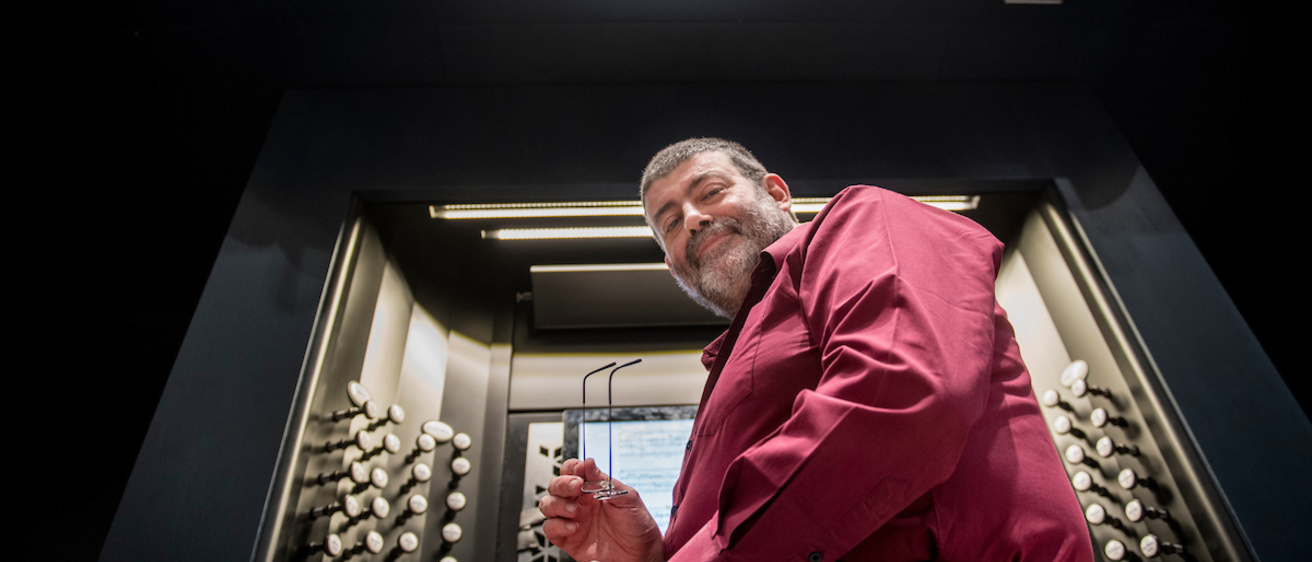After a long eight-and-a-half-year wait, the University of Iowa’s majestic new Klais organ is ready to be shown to the world—and its inaugural performance will be unlike anything ever seen before in the Americas.
The original Voxman Music Building and its organ were destroyed by floodwaters in 2008. Associate Professor of Organ Gregory Hand continued instruction and performances in temporary facilities while also researching what kind of organ the new building, which subsequently opened in the fall of 2016, should have.
The inaugural organ recital, featuring Kevin Bowyer and presented by the UI School of Music, will take place in the Voxman Music Building’s
concert hall on Friday, Feb. 10, beginning at noon.
His research and recommendation led to a committee ultimately settling on an organ modeled after the one in Germany’s Schwerin Cathedral. The UI’s new German Romantic organ, built by Orgelbau Klais, was unveiled in October and has been used for instruction—though not yet for performance.
While searching for the school’s new organ, Hand says he spent a lot of time thinking about how best to inaugurate the instrument. He found his answer in 2012.
Kevin Bowyer, a world-renowned organist from the University of Glasgow, had performed in the UI’s temporary recital hall. Just two years earlier, Bowyer had become the only organist to play composer Kaikhosru Shapurji Sorabji’s Second Organ Symphony in its entirety.
Previously considered impossible to perform, the piece takes an incredible eight-and-a-half hours to complete, with only two pauses among its three movements.
Hand recalls the conversation when he first asked Bowyer about performing the piece.
“I said, ‘Kevin, is this a stunt? What is the deal with this Sorabji thing?’” Hand says. “He took offense at that, actually, and said, ‘It changed my life, and the people who came, it changed their lives forever.’
“(Bowyer is) an absolute giant in our field. When he said that, I decided that I wanted to bring that to Iowa.”
Bowyer is the only organist to have performed the Second Organ Symphony in its entirety—once in Glasgow and again in Amsterdam, just weeks later, in 2010. Now he will bring Sorabji to the UI for the highly anticipated inaugural organ recital Friday, Feb. 10, in Voxman’s 700-seat concert hall. The performance begins at noon and likely will conclude at about 9 p.m.
Tune in to a live stream of the performance on the School of Music website.
With nearly seven years between performances of a piece that is as complex as it is long, Bowyer’s preparation for the UI recital has been grueling to say the least.
“The level of rehearsal required to get this piece within any kind of a presentable performance is so huge,” says Bowyer. “You’re strapped to the organ; you can’t go anywhere because you have to do the work.”
Bowyer arrived two weeks ahead of the performance to make his final preparations, but he’s spent the better part of the last year rehearsing for Friday’s recital.
Over the last seven months, Bowyer’s rehearsal days often started at 6 or 7 a.m. and could last until 9 p.m., with the occasional breaks for meals, coffee, or to tend to his responsibilities at the University of Glasgow.
“There still isn’t enough time to tackle it all,” Bowyer says. “You can spend a lifetime on this piece.”
Bowyer says he feels a great deal of responsibility playing the inaugural recital and has grown fond of the Klais organ since he arrived at the UI on Jan. 28.
“The organ’s lovely,” says Bowyer. “It has its own unique voice and a very clear sound, which actually suits the dense textures (of the piece) very well.”
Even after all the preparation, a massive physical and psychological challenge remains in actually performing the piece.
Bowyer says the first movement can last 85 to 90 minutes, followed by a 30-minute pause. The second movement is about four-and-a-half hours, followed by a 45-minute pause. The final movement lasts about three hours. Getting through the piece in its entirety is as much an athletic achievement as it is an artistic one.
“In order to get through any one of the three movements, I need the adrenaline of a performance,” Bowyer says. “It’s really exhausting playing through even the shortest of the three movements. Pacing is quite important.”
No other organ piece comes close to Sorabji’s Second Organ Symphony, says Hand. That anyone has ever been able to complete it, as Bowyer has, may as well be the musical equivalent of climbing Mount Everest.
“When you arrive at the last chord, it does feel as if you’re standing on top of a large mountain,” Bowyer says.
Those who are interested in staying for the entire performance will be seated in the balcony of Voxman’s concert hall. Meanwhile, lower-level seating will remain open throughout the day for spectators to come and go as they please.
The UI recital could be the last time Sorabji’s Second Organ Symphony is performed, as Bowyer says he is not certain if he’ll attempt this “gargantuan task” again.
Hand recommends that those interested in seeing the culmination of the performance arrive at Voxman about 8 p.m., which leaves enough time for the listener to experience Sorabji and the immenseness of the piece.
“My dream is that we can get the hall packed when Kevin crosses the finish line,” says Hand. “This is an incredible athletic, musical, and intellectual achievement. When he turns around, I hope that there are 700 people cheering for him.”
